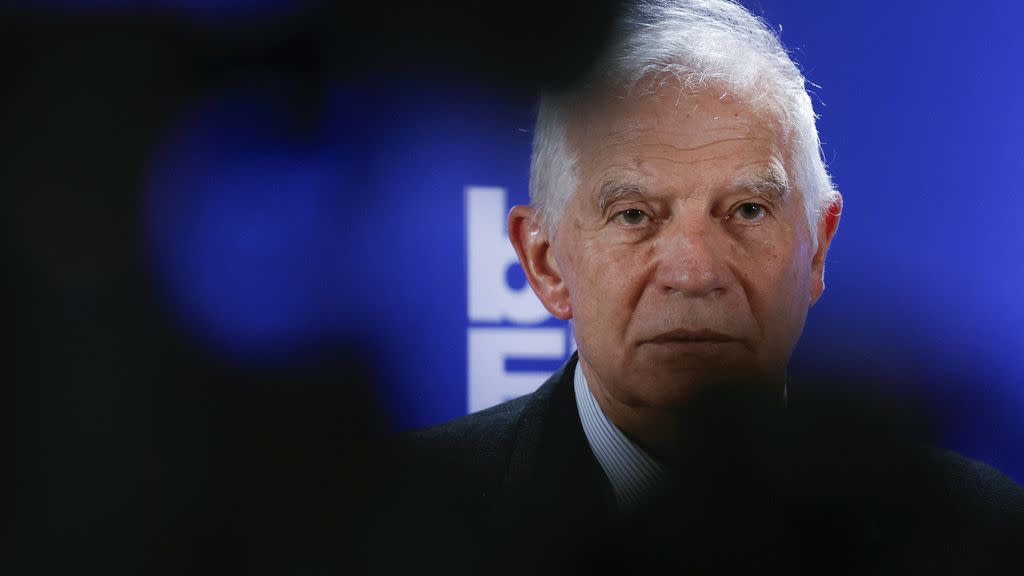EU concerned by "domino effect" of Israel-Hamas War

The European Union on Saturday expressed deep concern over reports that the Israeli military intends to take its battle against Hamas to the town of Rafah at Gaza’s border with Egypt where more than a million people have escaped the fighting.
EU foreign policy chief Josep Borrell warned that the conflict is likely to spread throughout the region unless a ceasefire is agreed between Israel and Hamas, after US airstrikes hit dozens of sites in Iraq and Syria used by Iranian-backed militias and the Iranian Revolutionary Guard.
Borrell said that around 1 million Palestinians “have been displaced progressively against the Egyptian border. They claimed they were safe zones, but in fact what we see is that the bombing affecting the civilian population continues and it is creating a very dire situation.”
Israeli Defence Minister Yoav Gallant said Thursday that after Israeli troops seize the southern city of Khan Younis, from where tens of thousands of people have fled, they will move on to Rafah. He did not give a time frame.
Such an offensive could push the refugees into Egypt, undermining Israel's peace agreement with the country and risking angering the US. It might also torpedo slow-moving peace talks with Hamas and complicate efforts to release scores of Israelis abducted when the militant group rampaged through southern Israel on 7 October.
The prospect of a ground war in Rafah has raised fears about where the population would go to find safety. The United Nations said the town is becoming a “pressure cooker of despair”.
Speaking in Brussels, where he was chairing informal talks among EU foreign ministers, Borrell said that the Israel-Hamas war has created “a domino effect,” with conflict also erupting in Lebanon, Iraq, Syria and in the Red Sea area.
“We are living a critical situation in the Middle East, in the whole region,” he said. “As long as the war in Gaza continues, it is very difficult to believe that the situation in the Red Sea will improve, because one thing is related with the other.”
Belgian Foreign Minister Hadja Lahbib, whose country currently holds the EU’s rotating presidency, warned of “a real risk of spillover of the conflict.”
“It’s a huge concern. We ask for restraint, and we ask for dialogue and diplomacy. It’s the only way we can calm down the situation in the Middle East,” she said.
Radek Sikorski, the foreign minister of Poland, a staunch US ally, said those targeted in the US airstrikes had it coming. “Iran’s proxies have played with fire for months and years and it’s now burning them,” he said.
Austrian Foreign Minister Alexander Schallenberg said he believes “that those who are attacking US bases have to know that they are actually pouring oil into the fire.” He warned that ”this is a powder keg, the whole Middle East, and there are too many people running around with matches.”
After the meeting, Borrell also expressed concern about the fate of the UN relief agency working with the Palestinians, after 12 UNRWA staff were accused of involvement in the 7 October attacks, leading the US and other countries to pull funding from Gaza's biggest humanitarian aid provider.
Borrell said the majority of ministers present from the 27 EU nations believe that UNRWA’s work is vital. While some countries have frozen their support, Borrell said that other ministers informed him that their governments would step up funding. He did not name them.
“UNRWA has been playing a critical role to support the Palestinian refugees, and not only in Gaza” but also in Lebanon and Jordan, Borrell said. “Who can substitute that overnight?” He said the EU welcomes the investigation launched by the agency.
Borrell also noted that Israel had been critical of UNRWA’s work for many years.


